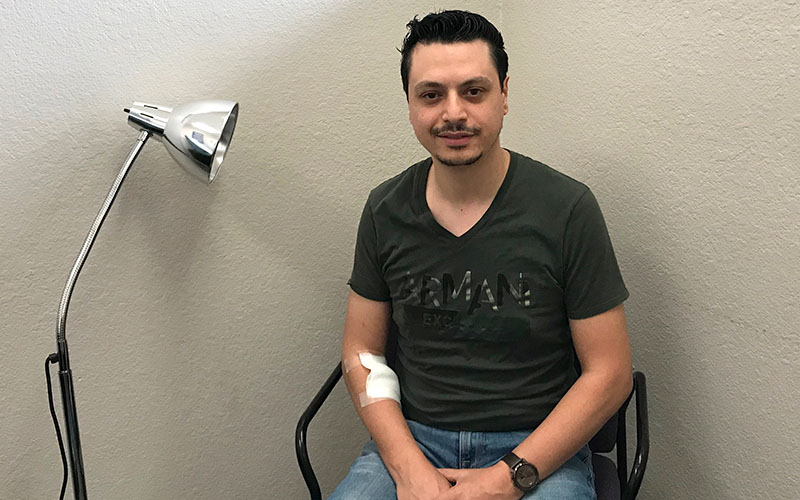
Chadwick Boseman talks about the film “Black Panther” at the 2017 San Diego Comic-Con International. Boseman died Aug. 28 at age 43. (Photo by Gage Skidmore/Creative Commons)
LOS ANGELES – The death of “Black Panther” star Chadwick Boseman, 43, after a four-year private battle with colon cancer has raised fresh concerns about how the illness disparately harms Black men, and it highlights what some experts call a shocking rise in the number of younger patients.
For fans who emulated the man and the superhero he portrayed, Boseman’s Aug. 28 death raises tough questions.
“If it happened to Chadwick Boseman, who had access to probably the best health care his money could buy, what about the average Joe?” asked Rhonda M. Smith, the interim executive director at California Black Health Network, a nonprofit based in Sacramento.
Boseman’s death highlights disparities in the Black community for colorectal cancer and death rates from all cancers, and it’s part of a recent trend, experts say. Although diagnoses of colorectal cancer in Americans 65 or older have been dropping in recent years, they have been rising in younger age groups for more than three decades, according to a March report from the American Cancer Society. In 2020, it said, 12% of colorectal cancer cases will be diagnosed in people younger than 50 – about 18,000 cases.
Among Black men in the U.S. in 2017, there were 8,729 new cases and 3,802 deaths related to colorectal cancer, according to the most recent data from the Centers for Disease Control and Prevention. The CDC found that 40 of the new cases and 19 of the deaths were in Arizona.
African Americans, compared with any racial or ethnic group, have the highest mortality rate for all cancers combined, making cancer a leading cause of death for the community. The U.S. Department of Health and Human Services found that Black men have lower five-year survival rates for most cancers than non-Hispanic white men.
Such disparities are nothing new, but COVID-19 may have shed a spotlight on them. Smith said a good place to start is by improving the health literacy of African Americans and Black immigrants.
There are multiple barriers to care for African Americans seeking early diagnosis or treatment, said Dennis Deapen, the director of the Los Angeles Cancer Surveillance Program and a professor of clinical preventive medicine at the University of Southern California. These barriers include a lack of access to health insurance, with Blacks 1.5 times more likely to be uninsured than whites from 2010 to 2018, according to a Kaiser Family Foundation analysis.
“There are barriers related to insurance,” Deapen said. “Whether one has insurance or whether one has a job that provides insurance. It’s related to employment, so when you have higher levels of unemployment, you’re going to have lower levels of insurance.”
Trust is also a major factor, and mistrust of medical care might discourage timely screenings and results. Black Americans are about a third less likely than white Americans to receive a physician’s recommendation for colorectal cancer screening, according to an age-adjusted analysis by the Journal of Health Care for the Poor and Underserved in 2013.
“In some non-white communities, there are mistrusts of medical care,” Deapen said. “There are certainly experiences of prejudice that might discourage a person from seeking medical care.”
Although racism can be obvious, Smith said, there are forms of racism we don’t see that can impact a Black person’s life and health care exeriences. Nurses, doctors and other care providers make countless decisions daily, she said, and when bias or preconceived ideas impact their choices, a Black person’s quality of care and life may be in danger.
Smith warned against “the racial biases that exist and permeate throughout our everyday lives that we don’t see, like decisions that get made for us, about us but not by us.”
Federal health experts and advocates differ on what’s the right age to begin screening for colorectal cancer. Although rates among the general population have declined over the years, the increase in diagnoses for those younger than 50 has spurred conversations on whether Americans should be screened at a younger age. The CDC recommends that Americans 50 or older are screened, whereas the American Cancer Society recommends age 45 or older.
When he died, Boseman was two years younger than the American Cancer Society’s recommended screening age. Patients of all races with a family history of colorectal cancer are recommended screening at age 40 or 10 years before the age of the youngest case in their immediate family, according to the Colorectal Cancer Alliance.
Deapen said he was shocked to see an increase in cases for those younger than 50. Although rare among that age group, colorectal cancer poses a threat when coupled with a lack of screening, increasing chances the disease will become incurable.
“Those risks are probably greater in certain racial-ethnic populations than others,” he said. “This is certainly a time to be looking very closely at this data, and I think, push the envelope in the direction of being aggressive in screening.”
Funding for colorectal cancer research is not as high as for other cancers, according to the American Cancer Society, so colorectal cancer isn’t talked about as frequently. The surprise death of Boseman may encourage those to review their family health history.
Smith said she would like to think Boseman’s death brought greater awareness to young people and that it encourages young people to consider getting screened at an earlier age or discussing it with a health care provider. Along with mournful posts, former athletes, entertainment and media professionals responded with calls for screening and awareness:
https://twitter.com/clmazin/status/1299590038489980929
To my black men….get your colon screening! We are more susceptible to die from colon cancer than any other group
— Damien Woody (@damienwoody) August 29, 2020
Waking up to the Chadwick Boseman news is perhaps the starkest warning yet. Colon cancer is absolutely ravaging the community of young Black men in our country and researchers are having a hard time figuring out why. #ripchadwickboseman
— Craig Melvin (@craigmelvin) August 29, 2020
Family history, obesity, smoking, lifestyle and many more unknown factors can play a part in colorectal cancer, according to Michael Sapienza, the CEO of Colorectal Cancer Alliance, a national nonprofit that raises awareness of the disease. Blood in the stool, cramping, unintended weight loss, fatigue and change in bowel habits all are symptoms to be aware of.
The alliance brings the community together through the Buddy Program, which pairs a trained cancer survivor or caregiver with patients, family members and other survivors. Some buddies have been a part of the program for 20 years and often are paired with those of similar experiences, such as a Black patient whose cancer is metastatic and a Black former patient who survived the disease.
Bringing the colorectal cancer community together is one of the alliance’s missions. After Boseman’s death, Sapienza issued a statement expressing certainty that Boseman’s death will bring awareness to the disease.
Sapienza said he would argue that Boseman’s passing will do more to advance, educate and screen than anything that’s happened since television journalist Katie Couric’s live colonoscopy on NBC News in 2000. Couric became a spokeswoman for colorectal cancer after her husband died from the disease at 42.
“There is no doubt in my mind, it (Boseman’s death) will make a huge difference, I don’t think just in the Black community,” he said.


